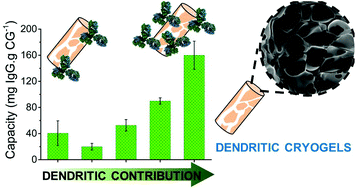Redefining the chemistry of super-macroporous materials: when dendritic molecules meet polymer cryogels†
Abstract
Considering affinity chromatography as one of the main application areas of super-macroporous polymers, the selectivity and specificity of the interactions between the matrix and the specific substrate are critical. The combination of classical and dendritic monomers (DMs) then represents a novel alternative in which multivalent interactions are possible. In this context, the so-called cryogels (CGs) – which are form from freezing-thawing processes – represent an appealing alternative due to their effective mass transport and good mechanical properties. The aim of this work was to present a strategy to yield dendritic polymer-based cryogels (dCGs) according to a sustainable methodology, as a potential support for immunoglobulin G (IgG) purification. We describe here the synthesis and characterization of polyethylene glycol dimethacrylate (PEGDMA) based CGs obtained by their co-polymerization with acrylamide (AAm) or acrylic acid (AAc) and/or di-tert-butyl 4-amino-4-(3-(tert-butoxy)-3-oxopropyl)heptanedioate hydrolyzed (ABAh) as DM. The polymerization reactions were photoinitiated under irradiation at 470 nm. The morphological characteristics, physicochemical properties and subsequent adsorption of IgG in dCGs were mainly controlled by the relative composition and type of monomers. The architecture of dCGs introduced a dendritic effect that acted synergistically on the structure/property relationship of the matrices.



 Please wait while we load your content...
Please wait while we load your content...